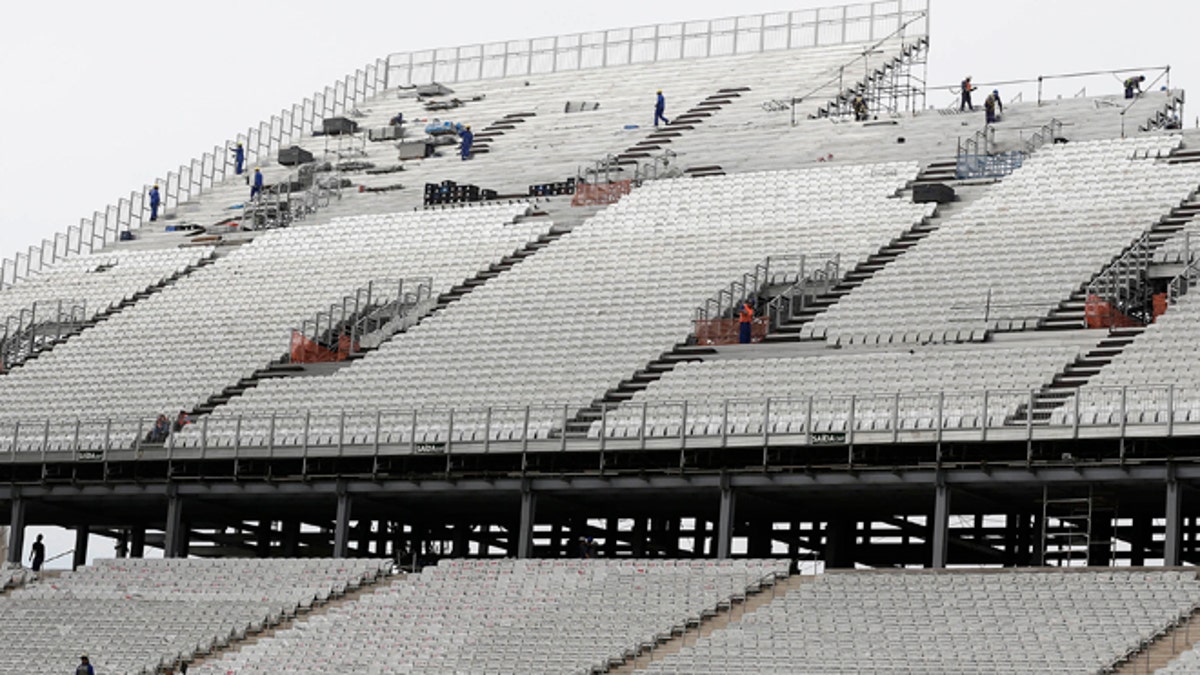
Laborers work on the construction of the Itaquerao stadium in Sao Paulo, Brazil, Tuesday, April 22, 2014. FIFA Secretary General Jerome Valcke said Tuesday there's still a lot of work to do at the stadium, but added that it will be ready for the opening match between Brazil and Croatia in June. (AP Photo/Andre Penner)
Brazil is scaling back its World Cup expectations and rushing to complete only projects they have to finish before the first game kicks off in just over a month.
A monorail in Sao Paulo, originally scheduled to be ready for the World Cup, has been delayed until 2015, a passenger terminal at the Fortaleza airport will not be complete, and the airport authority said an “interim terminal” will be installed for 90 days instead. Workers are rushing to complete the renovations of the stadium in the southern city of Curitiba.
“Brazil is a last-minute country. It will be ready, but at the last minute,” said Airton Oratz, a construction worker, told the Washington Post. “Just details are lacking.”
After years of missed due dates in preparation for the World Cup, the world’s largest soccer competition opens on June 12 in Sao Paulo with some of the 12 stadiums largely untested.
The Itaquerao Stadium in Sao Paulo, which will host the Brazil-Croatia opener, has been seen as the symbol of the host nation's much-criticized efforts amid protests that authorities are too focused on soccer and not the needs of the people.
The venue is late, expensive and within sight of an occupation of private land by thousands of protesters who claim they have been made homeless by rising rents in the neighborhood.
With 14,000 guests, including invited heads of state, in the 65,000-strong crowd for the opening match, the scrutiny on Sao Paulo will be intense and likely unforgiving.
"This is why we need to have a level of operation which is perfect," FIFA secretary general Jerome Valcke said.
Pressure on FIFA, local organizers and Brazil's infrastructure will not ease during a tough early-match schedule. There is the Spain-Netherlands match in Salvador and England-Italy in the remote new Manaus arena, quickly followed by Germany-Portugal in Salvador and Brazil-Mexico in Fortaleza.
"These stadiums will be used at 100 percent of capacity," Valcke said.
Valcke, who arrives in Brazil on May 18, said this week that "many things" could have been done differently during the past seven years the country has been preparing for the tournament.
"It is difficult. Maybe we should have involved the Brazilian government before," he said.
Valcke said street protests that marred the Confederations Cup last June will likely return during the 31-day, 64-match World Cup. However, political demonstrations and banners will not be allowed inside stadiums.
He said it was "naive" to think Brazilian people would remain calm for as long as their team stays in the competition.
"It goes beyond that," he said. "Reasons for being in the streets in 2013 have not changed. There are social problems in Brazil. It will take time."
The Associated Press contributed to this report.
Follow us on twitter.com/foxnewslatino
Like us at facebook.com/foxnewslatino








































